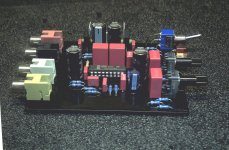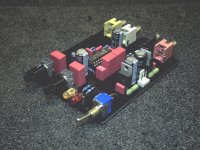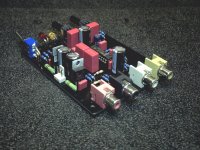CX-encoded Vinyl Records: Cx-Expander/-Decoder
Hi all.
Let me introduce my newest build:
a "CX Expander/Decoder"
Some month ago I leafed through my old electronic magazines and found articles and circuits for a "CX noise reduction system" for vinyl records.
The system was introduced around 1980. It uses specially coded LPs, but those can also be listened to without decoder.
Strangely enough, I can not remember having read about it at the time. So that was new to me and I became curious.
One of the circuits is quite simple by using a special CX-IC from Hitachi: HA12044. This is actually still to get as NOS. So I bought such an IC and made a board design for the circuit.
Today the device has been finished and immediately tested.
It works better than expected.
You hear almost no more running noise from the record; e.g. in empty grooves between music pieces.
With the cx-records quiet music passages are almost completely noise-free. But noises due to scratches and dirt etc. on the record can not be suppressed by the system, of course.
I was able to get some mint used CX LPs. There were not so many titles made with CX back then, and most of them do not match my taste in music, but I find the system so interesting that I wanted to try it.
(the same, at my own site, in german: CX-Decoder )
Hi all.
Let me introduce my newest build:
a "CX Expander/Decoder"
Some month ago I leafed through my old electronic magazines and found articles and circuits for a "CX noise reduction system" for vinyl records.
The system was introduced around 1980. It uses specially coded LPs, but those can also be listened to without decoder.
Strangely enough, I can not remember having read about it at the time. So that was new to me and I became curious.
One of the circuits is quite simple by using a special CX-IC from Hitachi: HA12044. This is actually still to get as NOS. So I bought such an IC and made a board design for the circuit.
Today the device has been finished and immediately tested.
It works better than expected.
You hear almost no more running noise from the record; e.g. in empty grooves between music pieces.
With the cx-records quiet music passages are almost completely noise-free. But noises due to scratches and dirt etc. on the record can not be suppressed by the system, of course.
I was able to get some mint used CX LPs. There were not so many titles made with CX back then, and most of them do not match my taste in music, but I find the system so interesting that I wanted to try it.
(the same, at my own site, in german: CX-Decoder )
Attachments
Last edited:
Wow, good job, cannot believe that nobody responded to your thread. I remember reading about CX when it came out, shows my age.
Thank you, leadbelly
It is perhaps due to the thread title, that this topic finds little interest. Maybe it does not say anything to anybody.
The CX system works really well. From the listening experience you can reach CD level; concerning background / running noises / hiss / subsonic.
Astonishing that CX could not even establish to a small extent.
As I was able to read in the meantime, this was not only due to the upcoming CD. There was also resistance in some recording studios.
The purchase of the decoder was too expensive for the customer or its adjustment too laborious.
Incomprehensible for me, considering, for which balderdash much more was paid otherwise .
(such as for devices like the Denon "Phono Crosstalk Canceller" etc. 🙄)
Calibration of the decoder requires a calibration record that came with most decoders.
When changing the turntable, the pickup, etc., the decoder must be readjusted.
But this is quite simple, there are two indicator LEDs and one controller pot per channel.
When playing the test signal, the pot of each channel must be set so that one LED just extinguished and the other lights up. That's all.
In my opinion, the CX system would be worth reviving for newly produced vinyl LPs.
It is perhaps due to the thread title, that this topic finds little interest. Maybe it does not say anything to anybody.
The CX system works really well. From the listening experience you can reach CD level; concerning background / running noises / hiss / subsonic.
Astonishing that CX could not even establish to a small extent.
As I was able to read in the meantime, this was not only due to the upcoming CD. There was also resistance in some recording studios.
The purchase of the decoder was too expensive for the customer or its adjustment too laborious.
Incomprehensible for me, considering, for which balderdash much more was paid otherwise .
(such as for devices like the Denon "Phono Crosstalk Canceller" etc. 🙄)
Calibration of the decoder requires a calibration record that came with most decoders.
When changing the turntable, the pickup, etc., the decoder must be readjusted.
But this is quite simple, there are two indicator LEDs and one controller pot per channel.
When playing the test signal, the pot of each channel must be set so that one LED just extinguished and the other lights up. That's all.
In my opinion, the CX system would be worth reviving for newly produced vinyl LPs.
"At a recent demonstration, this listener was impressed with the hushed quiet of properly decoded CX disks, which allowed every sonic detail to stand out with almost palpable plasticity. The effect of crystalline sonic delineation was indeed similar to what is heard from fully digital laser disks. The CX record, however, differs from the laser disk in retaining such familiar drawbacks as susceptibility to dirt and wear as well as dependence on proper stylus tracking for optimal results. (The laser disk, by contrast, surmounts all those limitations.)"
Sound; CBS IMPROVES THE STANDARD LP DISK - The New York Times
"The process was controversial among CBS executives and unpopular with some artists. Classical guitarist Liona Boyd demanded that the CX encoded version of one of her albums be withdrawn because of perceived shortcomings....."
CX (audio - Wikipedia)
"...converting to CX at an average cost of $75 for the adapter will be a lot cheaper than converting to the laser disk, at a projected cost of $700 per player."
Sound; CBS IMPROVES THE STANDARD LP DISK - The New York Times
This was not the only compression scheme. CBS could be clumsy about licensing their inventions around the industry; indeed I can't think of much good coming out of CBS in this period. As we now know, the Buyers waited for "optical" (but on 5-inch CD) to come down in price and then the LP died.
Sound; CBS IMPROVES THE STANDARD LP DISK - The New York Times
"The process was controversial among CBS executives and unpopular with some artists. Classical guitarist Liona Boyd demanded that the CX encoded version of one of her albums be withdrawn because of perceived shortcomings....."
CX (audio - Wikipedia)
"...converting to CX at an average cost of $75 for the adapter will be a lot cheaper than converting to the laser disk, at a projected cost of $700 per player."
Sound; CBS IMPROVES THE STANDARD LP DISK - The New York Times
This was not the only compression scheme. CBS could be clumsy about licensing their inventions around the industry; indeed I can't think of much good coming out of CBS in this period. As we now know, the Buyers waited for "optical" (but on 5-inch CD) to come down in price and then the LP died.
addendum:
Meanwhile, I have found that you do not necessarily need a calibration record in this decoder design. When playing a CX-LP it is also sufficient if the controls are adjusted so that with louder pieces of music, where no CX level boost occurred, the volume is the same when the decoder is switched on or off.
Meanwhile, I have found that you do not necessarily need a calibration record in this decoder design. When playing a CX-LP it is also sufficient if the controls are adjusted so that with louder pieces of music, where no CX level boost occurred, the volume is the same when the decoder is switched on or off.
Techmoan's YouTube video is what inspired me to google if there was a schematic for the CX Decoder and I stumbled on this site.
Hi!
@swl1975
I have just seen your post. Do you found / still need a circuit diagram?
I am very interested in circuit diagram for HA12044 based CX decoder. I own Telefunken RN100CX ( direct copy from the CBS patent, same as Phase Linear 220 CX and at least one more US manufacturer, only with MM phono stage with unusually wide sensitivity adjustment range added ).
I really like your clean version, using premium parts available nowadays. Do you also have the print for the PCB or even PCB available ?
There was perhaps THE BEST version - published in Popular Electronics magazine, January 1982. https://www.americanradiohistory.com/Archive-Poptronics/80s/1982/Poptronics-1982-01.pdf And I managed to find a "follow up" by the very designber of this CX decoder ... - with a VERY interesting story of behind the scenes action(s) at the time : Vinyl CBS CX Encoding
I am very interested in circuit diagram for HA12044 based CX decoder. I own Telefunken RN100CX ( direct copy from the CBS patent, same as Phase Linear 220 CX and at least one more US manufacturer, only with MM phono stage with unusually wide sensitivity adjustment range added ).
I really like your clean version, using premium parts available nowadays. Do you also have the print for the PCB or even PCB available ?
There was perhaps THE BEST version - published in Popular Electronics magazine, January 1982. https://www.americanradiohistory.com/Archive-Poptronics/80s/1982/Poptronics-1982-01.pdf And I managed to find a "follow up" by the very designber of this CX decoder ... - with a VERY interesting story of behind the scenes action(s) at the time : Vinyl CBS CX Encoding
I found the Popular Electronics edition from 1982 interesting , not only for CX noise reduction but it had a review of technicolor 1/4 inch VCR that I bought cheap at a "going out of busness" sale . At that time though it was like an orphan I knew nobody else that had that format.
I'm doing research on the CX system as part of an audio archive, could I chat to you about some of the details?
I think it's cool that people are still interested in CX. I'm the inventor of CX and the designer of the CBS expander and studio compressor.
@glaberson
A friend of mine built a fairly good quality record lathe and i think i'd be interested in building a discrete version of both the encoder and decoder if you'd be willing to help us.
A friend of mine built a fairly good quality record lathe and i think i'd be interested in building a discrete version of both the encoder and decoder if you'd be willing to help us.
I don't have any design notes from that project, but I'd be happy to answer any questions that I can. As you probably know, the design topology of the expander is shown in:
US4376916A - Signal compression and expansion system
- Google Patents
US4376916A - Signal compression and expansion system
- Google Patents
what about the
UREI 1181 (CX Encoder/Decoder)
Here you can download it as PDF, it comes with complete circuit diagram.
Studio: UREI 1181 : Free Download, Borrow, and Streaming : Internet Archive
UREI 1181 (CX Encoder/Decoder)
Here you can download it as PDF, it comes with complete circuit diagram.
Studio: UREI 1181 : Free Download, Borrow, and Streaming : Internet Archive
Hi I recently acquired a CX encoded LP by chance and was curious about decoding it to try out the system. This is the cleanest and, by far, the lowest component count circuit I've been able to find for CX decoding. Is it still possible to get a full schematic?
- Home
- Source & Line
- Analogue Source
- CX-Expander/-Decoder



